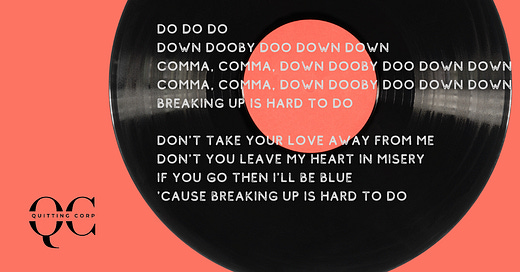“Breaking up is hard to do," a huge doo-wop hit from the sixties, has a sticky refrain that speaks of pain everyone knows. Neil Sedaka's "Do-oo-oo" captures the stretched-out agony of separation
A breakup with work is also heartbreaking. Beyond the money we do the work for and depend on, our brains create a zillion connections that humanize our workplace. Like a human partner, it shapes our identity, raises our sense of self, and cares for us.
"I know that it's true” because I experienced my fair share of breakups and pain over many years of working. I have been laid off, had my role eliminated, and I have left jobs of my own accord, either because the relationship was toxic or because I found a better-looking opportunity elsewhere.
Regardless of who takes the first step, the separation process has several stages that follow an upside-down arc: it will get worse before it gets better.
The 10 Stages of a Work BreakUp
The stages on my list reflect my own experience and survival guide. They are loosely modeled after the stages of grief but for business. Knowing about them won't make you feel good if you're going through a breakup, but it might provide some context for what you're experiencing and raise the specter of hope that this, too, will pass.
A caveat: This breakup analogy will not capture the depth of pain for anyone without a financial safety net, for whom job loss triggers much more profound grief responses far beyond relationship dynamics.
Stage #1 – Weak Signals: Early warning signs emerge as subtle changes in behavior, priorities, and engagement, whether you're being let go or planning to leave.
Stage #2 – The Blindside: The moment of truth arrives with a devastating impact if unexpected; or liberating excitement if you initiated it.
Stage #3 – Immediate Concerns Take Over: Practical matters, especially finances, demand attention as you navigate severance, benefits, finances, unemployment, and next steps—reactively or according to your pre-planned strategy.
Stage #4 – Self-questioning: Self-doubt surfaces as you measure yourself against others or question your former importance in the workplace.
Stage #5 - Social Recalibration: As you adjust to your new status, your professional social presence undergoes protective withdrawal or strategic visibility.
Stage #6 – Drift: A period of uncertainty creates space for processing and reflection before your next direction becomes clear.
Stage #7 – Pivot: You actively reorient toward new possibilities, either by exploring fresh options after rejection or by confidently building on your strengths.
Stage #8 – Relaunch: New opportunities emerge as you pursue them with renewed energy, gradually letting memories of your previous workplace fade.
Stage #9 – Integration: As you incorporate the transition into your broader career story, your professional narrative becomes whole again.
Stage #10 – Expansion: The experience becomes a catalyst for growth—transforming initial rejection into an opportunity or validating your decision to advocate for yourself.
Being dumped or initiating a breakup shapes how you experience the separation, navigate shock and self-doubt, and rebuild. Choosing to leave can be liberating and validating. There is no better word than "horrible” to describe the feeling of being fired.
In this PDF, I explore how each stage manifests differently depending on who initiated the breakup. Read on to learn more.
[K]Now You – Be a curious, life-long learner
Your Quitting Corp editor is moving steadily through the upside-down arc of stages. Following my latest breakup and the launch of this newsletter, I am hovering around Stage 8.
If you are anxious about your work relationship because of all the uncertainty around us and the certainty that automation and AI will change the workplace, get help. Talk it out with a friend. If you have any energy left, apply it to upskilling, reskilling, and whatever else you can so your skills never become outdated.
The World Economic Forum's Future of Jobs Report 2025 predicts a lot of job “displacement” from now through the end of this decade. Displacement is a poor choice of word, I think. Real people will lose jobs. They may not be "placed” elsewhere, as surviving job titles will require entirely new skills. While the report optimistically forecasts eventual net job creation, the burden of adaptation falls squarely on workers.
Skills expected to be in high demand include analytical thinking, AI and big data, technology literacy, creative thinking, leadership, and social influence.
Now go.






Yowza! That’s scary. All I can do is keep showing up and see what happens. 2026 and beyond could be a shit show for a lot of people. Congratulations on reaching Stage 8 of Quitting Corp!
Love this one!! Very timely <3